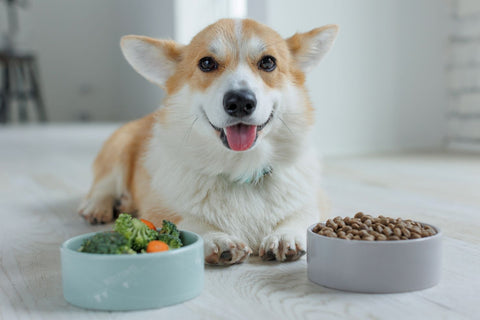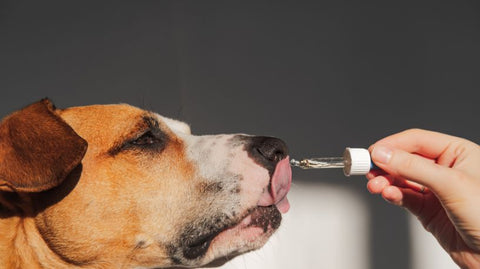

Improve Your Dog's Gut Health: Essential Tips
As a caring pet owner, you want your dog to feel good and be happy. A big part of this is their gut health. When a dog's gut is not healthy, it can cause different kinds of health problems and pain. In this post, we will show you how to spot the signs of an unhealthy gut in your dog. This way, you can help your dog feel better and keep that tail wagging.
How important is a dog's gut health for their overall well-being?
A dog's gut health is important for their overall well-being. It affects how they digest food, their immune system, and even their mood. A healthy gut helps them absorb nutrients properly. It also lowers the chances of getting sick and helps keep their mood balanced.
Common Signs of an Unhealthy Gut
- Digestive Issues
- Diarrhea or Constipation: Frequent diarrhea or constipation can show that the gut is not balanced.
- Gas and Bloating: Too much gas and a bloated stomach can point to poor digestion and gut problems.
- Vomiting: Throwing up once in a while is normal, but if it happens often, you should be concerned.
- Changes in Appetite
- Loss of Appetite: A sudden lack of interest in food could mean your dog is having gut discomfort.
- Increased Hunger: A bad gut sometimes leads to more hunger. This happens because the body is trying to make up for not getting enough nutrients.
- Weight Fluctuations
- Weight Loss: Unexplained weight loss might mean your dog is not absorbing nutrients well.
- Weight Gain: Gaining weight even with a normal diet could point to metabolic issues linked to gut health.
- Behavioral Changes
- Lethargy: A dog with gut health problems may feel tired and be less active than usual.
- Irritability: Discomfort in the gut can make your dog feel more irritable or anxious.
- Skin and Coat Issues
- Dull Coat: A shiny coat shows good health. A dull or dry coat might mean poor gut health.
- Itchy Skin: Ongoing itching or hot spots could be related to gut imbalances.
What Causes an Unhealthy Gut?
Understanding the main causes can help you stop and fix gut problems.
- Poor Diet: Giving your dog low-quality food with fake ingredients can damage their gut.
- Antibiotics: Even though they can be needed sometimes, antibiotics may upset the natural balance of gut bacteria.
- Stress: Dogs can have gut problems when they feel stressed, just like people do.
- Parasites: Worms and other parasites can cause serious problems in your dog's digestive system.
How to Improve Your Dog's Gut Health
Here are some steps you can take to help your dog have a healthy gut:
- High-Quality Diet
- Give a balanced diet with natural ingredients.
- Think about adding natural digestive supplements to help your dog's healthy gut.
- Regular Exercise
- Make sure your dog gets enough exercise to keep good overall health.
- Routine Vet Check-Ups
- Visiting the vet regularly can help find and fix gut issues early.
- Stress Management
- Create a calm and steady place for your dog to feel safe.
- You can use calming supplements if needed.
- Parasite Control
- Deworm your dog often and check for any parasites.
articlebanners1
Importance of a High-Protein, Low-Carbohydrate Diet
A good diet for your dog should be high in protein and low in carbs. This type of diet is helpful for their gut and overall health. It is similar to what their wild ancestors ate. It also gives them important fatty acids like DHA and EPA. High-protein foods help keep their muscles strong and give them needed nutrients. On the other hand, less carbs can help avoid gut problems like swelling and gas. A well-balanced diet that has enough protein and fats can also keep their coat and skin healthy. By focusing on your dog's gut health and providing the right nutrition, you can help them feel good and happy.
The Role of Fiber in Gut Health
Fiber is very important for your dog's digestive health, just like it is for humans. It helps keep their gut healthy by promoting regular bowel movements and supports nutrient absorption. A good amount of fiber also supports the growth of good bacteria in the gut. To help your dog, you should add fiber-rich foods to their diet. This includes vegetables, fruits, and whole grains. Doing this can help prevent constipation and diarrhea. It can also help control blood sugar levels and improve digestion. Additionally, fiber acts as a prebiotic. This means it feeds the good bacteria in the gut and helps them work better. Providing enough fiber along with a balanced diet and quality dog food can make a big difference for your dog's gut health and overall well-being.
Identifying and Managing Food Intolerances and Allergies
Not every dog can eat anything they want. Does that sound familiar? My old Husky, Cooper, could not have chicken. It took us some time to figure that out. Finding food allergies or intolerances early can be tough. However, it is very important to keep your dog healthy and comfortable.
You might notice that your dog is not doing well with their food if they are itching too much, have stomach issues, or have a dull coat. Keeping a food diary and talking often with your vet can help you find out which ingredients are causing problems for your dog.
Once you know the issue, you might need to switch to a special diet. This could mean using hypoallergenic food or taking out certain ingredients from their meals. Taking care of your dog's gut health, where more than 70% of immune cells are found, is very important for their comfort and overall well-being. A happy gut means a happy pup!
articlebanners2
When to Consult a Veterinarian for Gut Health Issues
When you think about your dog's diet and digestive health, it's important to keep your vet informed about any changes or problems. If your dog has ongoing digestive issues like diarrhea, vomiting, excessive gas, or bloating, you should seek medical help. These could mean there are deeper gut health problems that need a vet's attention. Your veterinarian can run tests to find out what is affecting your dog's digestive health and suggest specific treatments. Always remember, talking to your vet helps keep your furry friend happy and healthy.
Incorporating Probiotics and Prebiotics into Your Dog's Diet
Prebiotics and probiotics are very important for your dog's digestive health and immune support. Prebiotics help healthy bacteria grow. Probiotics are live, beneficial bacteria. Together, they help keep a healthy gut microbiome in your dog. Adding both to your dog's diet can help keep a good balance of gut flora. This helps with digestion and overall well-being. You can find pet foods or supplements that have prebiotics and probiotics. However, always talk to your vet before changing your dog's diet. You can also add natural sources of prebiotics and probiotics to your dog's meals. Foods like bananas, oats, or chicory root are good options. Probiotic supplements, suggested by your vet, can also help create a thriving gut microbiome.
The Benefits of Digestive Enzymes for Dogs
Digestive enzymes are important for your dog's gut health. They help break down food so your dog can absorb nutrients better. They play a significant role in ensuring your dog avoids deficiencies in enzymes, which could cause digestive issues like gas, bloating, or diarrhea. Adding digestive enzyme supplements to your dog's meals can improve digestion. This is especially helpful for older dogs or those with specific health problems. Always talk to your vet before adding new supplements to make sure they fit your dog's needs.
Effective Management of Stress and Its Impact on Gut Health
Stress can affect our health, both physically and mentally. This is true for our dogs as well. When dogs feel stressed, it can upset their gut health and lead to an upset stomach. This means it can mess with the good bacteria in their digestive system. As a result, they may face problems like diarrhea or constipation. A bad stomach can also lead to pain and anxiety, making things worse for them.
To help your dog feel less stressed and improve their gut health, you can add calming activities to their routine. Regular exercise, playful interactions, and a safe, comfy space can be very helpful. You may also want to talk to your vet. They can suggest supplements or medications to help relieve stress-related gut issues. If you are looking for natural options, CBD Oil or melatonin for dogs can be great choices to keep them calm and stress-free.
Conclusion
Checking your dog's gut health is very important for their overall well-being. If pet parents notice signs that their dog's gut might be unhealthy, they can take steps to help. A happy gut leads to a happy pup! If you see any worrying symptoms, be sure to talk to your veterinarian for expert help.
For more tips and products to help your dog's health, go to Prana Pets. Check out our selection of natural supplements. Let's keep those tails wagging and bellies happy!
articlebanners3




